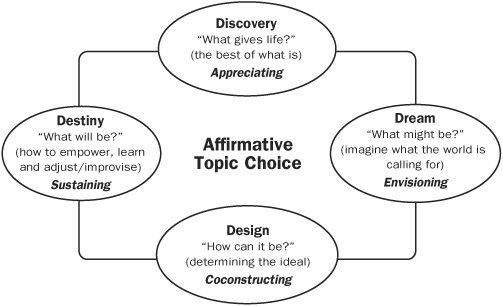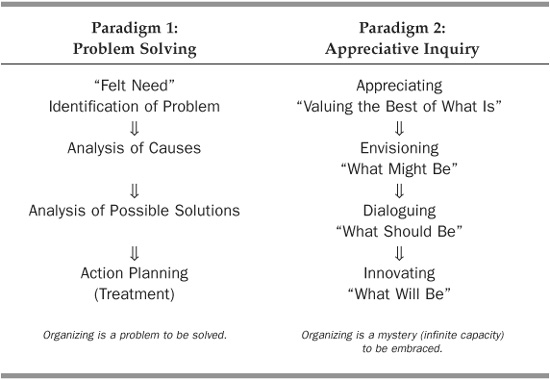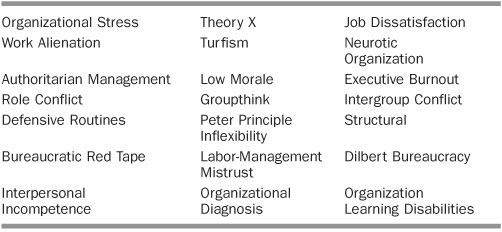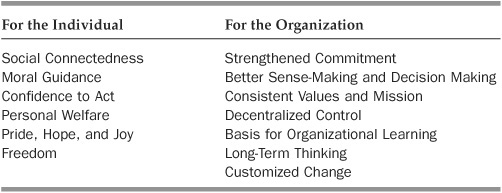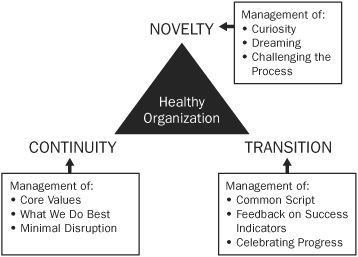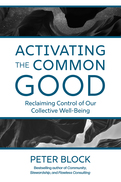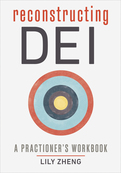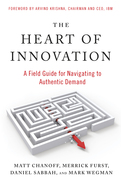
Download PDF Excerpt
Rights Information
The Appreciative Inquiry Handbook 2nd Edition
For Leaders of Change
David Cooperrider (Author) | Ronald Fry (Foreword by) | Diana Whitney (Author) | Jacqueline Stavros (Author)
Publication date: 01/10/2008
Bestseller over 40,000+ copies sold
The Appreciative Inquiry Handbook contains everything you need to launch any kind of AI initiative. The authors provide background information on what AI is and how it works, and offer sample project plans, designs, agendas, course outlines, interview guidelines, participant worksheets, a list of resources, and more. From abstract principles underlying AI to actual tools used in different settings, from detailed descriptions of AI interventions to practical tips to classic AI articles, this workbook presents all of the introductory concepts, examples, and aids necessary to engage yourself and others in Appreciative Inquiry.
One of today’s most popular change methods, Appreciative Inquiry (AI) has been used to undertake transformational initiatives in dozens of organizations, ranging from McDonald’s to the U.S. Navy to Save the Children. The assumption of AI is simple. Every organization has things that work right—things that give it life when it is vital, effective, and successful. AI begins by identifying this positive core and connecting organizational visions, plans, and structures to it in ways that heighten energy and inspire action for change.
This book presents all of the concepts, examples, and aids necessary to engage groups of all sizes in Appreciative Inquiry. The authors provide background information on what AI is and how it works and offer sample project plans, designs, agendas, course outlines, interview guidelines, participant worksheets, a list of resources, and more. This second edition has been extensively revised, updated, and expanded, including new case studies, new tools and supplemental articles, an expanded bibliography and resource list, and an entirely new chapter on case applications. And throughout, the authors focus on how AI can support an organizational focus on sustainability and the “triple bottom line” of people, prosperity, and planet.
Find out more about our Bulk Buyer Program
- 10-49: 20% discount
- 50-99: 35% discount
- 100-999: 38% discount
- 1000-1999: 40% discount
- 2000+ Contact Leslie Davis ( [email protected] )
The Appreciative Inquiry Handbook contains everything you need to launch any kind of AI initiative. The authors provide background information on what AI is and how it works, and offer sample project plans, designs, agendas, course outlines, interview guidelines, participant worksheets, a list of resources, and more. From abstract principles underlying AI to actual tools used in different settings, from detailed descriptions of AI interventions to practical tips to classic AI articles, this workbook presents all of the introductory concepts, examples, and aids necessary to engage yourself and others in Appreciative Inquiry.
One of today’s most popular change methods, Appreciative Inquiry (AI) has been used to undertake transformational initiatives in dozens of organizations, ranging from McDonald’s to the U.S. Navy to Save the Children. The assumption of AI is simple. Every organization has things that work right—things that give it life when it is vital, effective, and successful. AI begins by identifying this positive core and connecting organizational visions, plans, and structures to it in ways that heighten energy and inspire action for change.
This book presents all of the concepts, examples, and aids necessary to engage groups of all sizes in Appreciative Inquiry. The authors provide background information on what AI is and how it works and offer sample project plans, designs, agendas, course outlines, interview guidelines, participant worksheets, a list of resources, and more. This second edition has been extensively revised, updated, and expanded, including new case studies, new tools and supplemental articles, an expanded bibliography and resource list, and an entirely new chapter on case applications. And throughout, the authors focus on how AI can support an organizational focus on sustainability and the “triple bottom line” of people, prosperity, and planet.
Jacqueline (Jackie) Stavros’ passion is working with others to create meaningful results for positive change. She is recognized for her creation of SOAR, a positive approach to strategic thinking, planning, and leading. She is a professor in the College of Business and Information Technology at Lawrence Technological University and Advisor for David L. Cooperrider Center for Appreciative Inquiry. She co-authored many articles and books with two recent: books, Conversations Worth Having: Using Appreciative Inquiry to Fuel Productive and Meaningful Engagement and Thin Book of SOAR: Creating Strategy that Inspires Innovation and Engagement (soar-strategy.com). She has worked across all sectors, including for-profit, nonprofit, government, and a wide spectrum of industries. She has worked in 25 countries using Appreciative Inquiry (AI) to affect the lives of thousands or people and hundreds of organizations improve capacity to thrive and increase performance. Her work has been featured in Forbes, SmartBrief, Detroit’s Live in the D, dbusiness Magazine, and leadership and training blogs and podcasts. She is a keynote speaker on positive approaches to leadership, strategy, and change. She earned a Doctorate of Management in Capacity Building Using an Appreciative Approach: A Relational Process of Building Your Organization’s Future.
Foreword
Preface
Acknowledgments
Introduction
Essential Elements of Appreciative Inquiry
Chapter 1: The Theoretical Basis of Appreciative Inquiry
Chapter 2: Appreciative Inquiry Process: How it Works
Chapter 3: Introducing, Defining and Planning an Appreciative Inquiry Initiative
Application of the 4-D Cycle of Appreciative Inquiry
Chapter 4: Discovery: What Gives Life?
Chapter 5: Dream: What Might Be?
Chapter 6: Design: How Can It Be?
Chapter 7: Destiny: What Will Be?
Learning Applications and Resources
Chapter 8: Sample Interview Guides and Summary Report
Chapter 9: AI Case Applications
Chapter 10: AI Worksheets
Chapter 11: The AI Classics: Selected Articles
Appreciative Inquiry Bibliography
Glossary of Terms
Index
Statement of Taos Institute
Taos Institute Publications
Statement of Appreciative Inquiry Consulting
Positive Organizational Scholarship
About the Authors
1
The Theoretical Basis of Appreciative Inquiry
Ap-pre’ci-ate, v., 1. to value; recognize the best in people or the world around us; affirm past and present strengths, successes, and potentials; to perceive those things that give life (health, vitality, excellence) to living systems. 2. to increase in value, e.g., the economy has appreciated in value. Synonyms: value, prize, esteem, and honor.
In-quire’, v., 1. to explore and discover. 2. to ask questions; to be open to seeing new potentials and possibilities. Synonyms: discover, search, systematically explore, and study.
This chapter begins by introducing the theory and creation of AI. Appreciative Inquiry is an organization development (OD) process and approach to change management that grows out of social constructionist thought and its applications to management and organizational transformation. Through its deliberately positive assumptions about people, organizations, and relationships, AI leaves behind deficit-oriented approaches to management and vitally transforms the ways to approach questions of organizational improvement and effectiveness. Such questions include culture change, survey analysis, strategic planning, organizational learning, customer focus groups, leadership development, team building, quality management, measurement systems, joint ventures and alliances, diversity training, performance appraisal, communications programs, internal online networks, corporate history writing and others.
Presented here is a thesis, a proposition regarding the future of OD and change management. The thesis is a significant shift from “traditional” problem-solving methodologies. AI exhibits embedded wisdom that is reminiscent of early pioneers such as Kurt Lewin, Mary Parker Follett, Herb Shepard, and others. The thesis might be summarized this way:
We may have reached the end of traditional problem solving. AI is a powerful approach to transformation as a mode of inquiry capable of inspiring, mobilizing, and sustaining human system change. The future of OD belongs, instead, to methods that affirm, compel, and accelerate anticipatory learning involving larger and larger levels of collectivity.
The new methods are distinguished by the art and science of asking powerful and unconditional positive questions. (Someday there will be an “encyclopedia of questions” that brings together classic formulations such as Maslow’s interview protocols on peak human experience and Peters and Waterman’s studies of organizational excellence or Vereena Kast’s exceptional studies of joy, inspiration, and hope.) The new methods view realities as socially constructed. Therefore, they will become more radically relational, widening the circles of dialogue to groups of hundreds, thousands, and perhaps (due to cyberspace) millions. The arduous task of intervention will give way to the speed of imagination and innovation. Instead of negation, criticism, and spiraling diagnoses, there will be discovery, dream, design, and destiny.
AI: A Brief Introduction
AI has been described in many ways. Here is a practitioner-oriented definition:
Appreciative Inquiry is the cooperative co-evolutionary search for the best in people, their organizations, and the world around them. It involves the discovery of what gives “life” to a living system when it is most effective, alive, and constructively capable in economic, ecological, and human terms. AI involves the art and practice of asking questions that strengthen a system’s capacity to apprehend, anticipate, and heighten positive potential. The inquiry is mobilized through the crafting of the “unconditional positive question,” often involving hundreds or thousands of people. AI interventions focus on the speed of imagination and innovation instead of the negative, critical, and spiraling diagnoses commonly used in organizations. The discovery, dream, design, and destiny model links the energy of the positive core to changes never thought possible.
AI is based on the simple assumption that every organization has something that works well, and those strengths can be the starting point for creating positive change. Inviting people to participate in dialogues and share stories about their past and present achievements, assets, unexplored potentials, innovations, strengths, elevated thoughts, opportunities, benchmarks, high-point moments, lived values, traditions, core and distinctive competencies, expressions of wisdom, insights into the deeper corporate spirit and soul, and visions of valued and possible futures can identify a “positive core.” From this, AI links the energy of the positive core directly to any change agenda. This link creates energy and excitement and a desire to move toward a shared dream.
AI, an approach to organizational analysis and learning, is also intended for discovering, understanding, and fostering innovations in social organizational arrangements and processes. In this context, AI refers to:
 A search for knowledge.
A search for knowledge.
 A theory of collective action designed to evolve the vision and will of a group, an organization, or a society as a whole.
A theory of collective action designed to evolve the vision and will of a group, an organization, or a society as a whole.
AI is deliberate in its life-centric search. Carefully constructed inquiries allow the practitioner to affirm the symbolic capacities of imagination and mind as well as the social capacity for conscious choice and cultural evolution. The art of “appreciation” is the art of discovering and valuing those factors that give life to a group or an organization. The process involves interviewing and storytelling to draw out the best of the past, to understand what one wants more of, and to set the stage for effective visualization of the future.
The following propositions underlie the practice of AI:
1. Inquiry into “the art of the possible” in organizational life should begin with appreciation. Every system works to some degree. Therefore, a primary task of management and organizational analysis is to discover, describe, and explain those “exceptional moments” that give life to the system and activate members’ competencies and energies. The appreciative approach takes its inspiration from “what is.” This is the first step of the process in the 4-D Cycle: Discovery. Valuing, learning, and inspired understanding are the aims of the appreciative spirit.
2. Inquiry into what is possible should yield information that is applicable. Organizational study should lead to the generation of knowledge that can be used, applied, and validated in action.
3. Inquiry into what is possible should be provocative. An organization is an open-ended, indeterminate system capable of becoming more than it is at any given moment and learning how to actively take part in guiding its own evolution. Appreciative knowledge of “what is” becomes provocative to the extent that the learning stirs members to action. In this way, AI allows use of systematic management analysis to help an organization’s members shape an effective future according to their imaginative and moral purposes.
4. Inquiry into the human potential of organizational life should be collaborative. This principle assumes an immutable relationship between the process of inquiry and its content. A unilateral approach to the study of social innovation is a direct negation of the phenomenon itself.
In its most practical construction, AI is a form of organizational study that selectively seeks to locate, highlight, and illuminate what are referred to as the life-giving forces of the organization’s existence, its positive core.
In this sense, two basic questions are behind any AI initiative:
1. What, in this particular setting and context, gives life to this system—when it is most alive, healthy, and symbiotically related to its various communities?
2. What are the possibilities—expressed and latent—to provide opportunities for more effective (value-congruent) forms of organizing?
AI seeks out the exceptional best of “what is” (Discovery) to help ignite the collective imagination of “what might be” (Dream). The aim is to generate new knowledge of a collectively desired future. It carries forth the vision in ways that successfully translate images into possibilities, intentions into reality, and beliefs into practice.
As a method of organizational analysis, AI differs from conventional managerial problem solving. The basic assumption of problem solving is that “organizing is a problem to be solved.” The task of improvement traditionally involves removing deficits by (1) identifying the key problems or deficiencies, (2) analyzing the causes, (3) analyzing solutions, and (4) developing an action plan.
In contrast, the underlying assumption of AI is that an organization is a “solution to be embraced” rather than a “problem to be solved.” The phases are shown in Figure 1.1, Appreciative Inquiry 4-D Cycle. It starts with selecting a topic: affirmative topic choice. What follows are Discovery (appreciating and valuing), Dream (envisioning), Design (coconstructing the future), and Destiny (learning, empowering, and improvising to sustain the future). These are the essence of dialogue woven through each step of the process.
Figure 1.1: Appreciative Inquiry “4-D” Cycle
The first step in this process is to discover and value those factors that give life to the organization. For example, the organization might discover and value its commitment and identify when that commitment was at its highest (affirmative topic choice: highest commitment). Regardless of how few or infrequent the moments of highest commitment were, the organization’s task is to focus on them and discuss the factors and forces that served as fertile ground for that exceptional level of commitment.
The First D is Discovery
The list of positive or affirmative topics for Discovery is endless: high quality, integrity, empowerment, innovation, customer responsiveness, technological innovation, team spirit, best in class, and so on. In each case, the task is to discover the positive exceptions, successes, and most vital or alive moments. Discovery involves valuing those things that are worth valuing. It can be done within and across organizations (in a benchmarking sense) and across time (organizational history as positive possibility).
As part of the Discovery process, individuals engage in dialogue and meaning-making. This is simply the open sharing of discoveries and possibilities. Through dialogue, a consensus begins to emerge whereby individuals in the organization say, “Yes, this is an ideal or a vision that we value and should aspire to.” Through conversation and dialogue, individual appreciation becomes collective appreciation, individual will evolves into group will, and individual vision becomes a cooperative or shared vision for the organization.
AI helps create a deliberately supportive context for dialogue. It is through the sharing of ideals that social bonding occurs. What makes AI different from other OD methodologies at this phase is that every question is positive.
From Discovery to Dream
Second, participants Dream, or envision what might be. It occurs when the best of “what is” has been identified; the mind naturally begins to search further and to envision new possibilities. Valuing the best of “what is” leads to envisioning what might be. Envisioning involves passionate thinking, creating a positive image of a desired and preferred future. The Dream step uses the interview stories from the Discovery step to elicit the key themes that underlie the times when the organization was most alive and at its best.
Articulated Dream(s) to Design
Third, participants coconstruct the future by the Design of an organizational architecture in which the exceptional becomes everyday and ordinary. This design is more than a vision. It is a provocative and inspiring statement of intention that is grounded in the realities of what has worked in the past combined with what new ideas are envisioned for the future. It enhances the organization by leveraging its own past successes and successes that have been experienced elsewhere with a “strategic intent.” Strategic intent signals what the organizations wants more of and recognizes that the future is built around what can be and what is.1
Design to Destiny
Fourth, the Design delivers the organization to its Destiny through innovation and action. AI establishes a momentum of its own. Once guided by a shared image of what might be, members of the organization find innovative ways to help move the organization closer to the ideal. Again, because the ideals are grounded in realities, the organization is empowered to make things happen. This is important because it is precisely through the juxtaposition of visionary content with grounded examples of the extraordinary that AI opens the status quo to transformations via collective action. By seeking an imaginative and fresh perception of organizations (as if seen for the very first time), the appreciative eye takes nothing for granted, seeking to apprehend the basis of organizational life and working to articulate the possibilities for a better existence.
Part 2 of the book covers the 4-D Cycle of AI in detail.
The principles that underlie AI are deeply grounded in scientific research (refer to “Positive Image, Positive Action: The Affirmative Basis of Organizing” in Chapter 11) and are highlighted in the remainder of this section in Mini-lectures I–IX. While the practitioner need not have a thorough understanding of these principles, it is often helpful when introducing AI to an organization to provide some of the supporting theory and research. The following presentation ideas are organized into nine brief mini-lectures. Each one refers to the theoretical constructs on which AI is based. Practitioners can successfully introduce AI by introducing and adapting these key concepts to the language and culture of the organization.
Mini-lecture I: Five Principles of AI
The following five principles inspired and moved the foundation of AI from theory to practice:
1. The Constructionist Principle
2. The Principle of Simultaneity
3. The Poetic Principle
4. The Anticipatory Principle
5. The Positive Principle
Launching an AI initiative requires an understanding of these principles to fully grasp AI theory and to internalize the basis of the 4-D Cycle.
The full conceptual article on these principles, “Appreciative Inquiry into Organizational Life,” is located in Chapter 11.
1. Constructionist Principle: Social knowledge and organizational destiny are interwoven. A constructionist would argue that the seeds of organizational change are implicit in the first questions asked. The questions asked become the material out of which the future is conceived and constructed. Thus, the way of knowing is fateful.2 To be effective as executives, leaders, change agents, and so on, one must be adept in the art of reading, understanding, and analyzing organizations as living, human constructions. Knowing organizations is at the core of virtually every OD task. Because styles of thinking rarely match the increasingly complex world, there must be a commitment to the ongoing pursuit of multiple and more fruitful ways of knowing.
The most important resource for generating constructive organizational change is cooperation between the imagination and the reasoning function of the mind (the capacity to unleash the imagination and mind of groups). AI is a way of reclaiming imaginative competence. Unfortunately, people’s habitual styles of thought include preconscious background assumptions, root metaphors, and rules of analysis that come to define organizations in a particular way. These styles have often constrained the managerial imagination and mind.
2. Principle of Simultaneity: This principle recognizes that inquiry and change are not truly separate moments; they can and should be simultaneous. Inquiry is intervention. The seeds of change are the things people think and talk about, the things people discover and learn, and the things that inform dialogue and inspire images of the future. They are implicit in the very first questions asked. One of the most impactful things a change agent or OD practitioner does is to articulate questions. The questions set the stage for what is “found” and what is “discovered” (the data). These data become the stories out of which the future is conceived, discussed, and constructed.
3. Poetic Principle: A useful metaphor in understanding this principle is that human organizations are an “open book.” An organization’s story is constantly being coauthored. Moreover, pasts, presents, and futures are endless sources of learning, inspiration, or interpretation (as in the endless interpretive possibilities in a good work of poetry or a biblical text). The important implication is that one can study virtually any topic related to human experience in any human system or organization. The choice of inquiry can focus on the nature of alienation or joy in any human organization or community. One can study moments of creativity and innovation or moments of debilitating bureaucratic stress. One has a choice.
4. Anticipatory Principle: The most important resource for generating constructive organizational change or improvement is collective imagination and discourse about the future. One of the basic theorems of the anticipatory view of organizational life is that the image of the future guides what might be called the current behavior of any organism or organization. Much like a movie projected on a screen, human systems are forever projecting ahead of themselves a horizon of expectation that brings the future powerfully into the present as a mobilizing agent. In the final analysis, organizations exist because people who govern and maintain them share some sort of discourse or projection about what the organization is, how it will function, what it will achieve, and what it will likely become.
5. Positive Principle: This last principle is more concrete. It grows out of years of experience with AI. Put most simply, momentum for change requires large amounts of positive affect and social bonding, attitudes such as hope, inspiration, and the sheer joy of creating with one another. Organizations, as human constructions, are largely affirmative systems and thus are responsive to positive thought and positive knowledge. The more positive the questions used to guide a group building an OD initiative, the more long-lasting and effective is the change.3 In important respects, people and organizations move in the direction of their inquiries. Thousands of interviews into “empowerment” or “being the easiest business in the industry to work with” will have a completely different long-term impact in terms of sustaining positive action than a study of “low morale” or “process breakdowns.”
These five principles are central to AI’s theoretical basis for organizing for a positive revolution in change. These principles clarify that it is the positive image that results in the positive action. The organization must make the affirmative decision to focus on the positive to lead the inquiry.
For more detailed information and application of the AI principles, refer to Dynamic Relationships: Unleashing the Power of Appreciative Inquiry in Daily Living by Jackie Stavros and Cheri Torres (Chagrin Falls, OH: Taos Institute Publishing, 2005).
Mini-lecture II: Positive Image—Positive Action
The power of positive imagery, as illustrated in the fifth principle, is a key factor in the AI dialogue. There are six main areas of research to support this premise: research into the placebo effect, Pygmalion effect, positive effect, internal dialogue, positive imagery, and metacognitive competence. This section briefly elaborates on each area. The original article “Positive Image, Positive Action: The Affirmative Basis of Organizing” appears in Chapter 11.
1. Powerful Placebo: The placebo effect is a fascinating process in which projected images, as reflected in positive belief, ignite a healing response that can be as powerful as conventional therapy or any other intervention. In the twentieth century, the placebo effect is accepted by most medical professions as genuine. Between one-third and two-thirds of all patients show marked physiological and emotional improvement in symptoms simply by believing they were given an effective treatment, even when that treatment was a sugar pill or some other inert substance. While the complex mind-body pathways are far from being completely understood, there is one area of clear agreement: positive changes in anticipatory reality through suggestion and belief play a central role in all placebo responses.
2. Pygmalion Effect: In the classic Pygmalion study,4 on the basis of “credible” information, teachers are led to believe that some of their students possess exceptionally high potential while others do not. Thus, the teachers are led, on the basis of some expert opinion, to hold a positive image (PI) or expectancy of some students, and a negative image (NI) or expectancy of others. Unknown to the teachers, however, is the fact that the so-called high-potential students were selected at random. In objective terms, all student groups were equivalent in potential and were merely dubbed as high, regular, or low in learning potential. As the experiment unfolds, differences quickly emerge—not on the basis of any innate intelligence factor or some other predisposition, but solely on the basis of the manipulated expectancy of the teacher. Over time, subtle changes among students evolve into clear differences, as the high-PI students began to significantly overshadow all others in actual achievement.
The key lesson is that cognitive capacities are cued and shaped by the images projected through another’s expectations. For example, what is seen is believed. As a result, actions and behaviors take on a whole new tone based on the perceived image. In turn, the resulting differential behavioral treatment makes the people receiving this treatment begin to respond to the positive images that others have of them. The greatest value of the Pygmalion research is that it provides empirical understanding of the relational pathways of the positive image—positive action dynamic.
3. Positive Effect and Learned Helpfulness: While still in the formative stages, early results on this issue suggest that positive imagery evokes positive emotions and positive emotions move people toward a choice for positive actions. Positive emotions are intimately connected with social helpfulness. This line of research is an expansion on an earlier, empirically validated theory of learned helplessness articulated by Martin Seligman and others in the growing field of positive psychology. Somehow, positive emotions draw people out of themselves, pull them away from self-oriented preoccupations, enlarge their focus on the potential good in the world, increase feelings of solidarity with others, and propel people to act in more altruistic and positive ways.5 For more than a dozen years, Dr. Barbara Fredrickson has been studying the effect of positive emotions in the workplace. Her work has demonstrated the improvement in individual and collective functioning, psychological well-being, and physical health due to positive imagery.6
4. Inner Dialogue (2:1): It is argued that all human systems exhibit a continuing “cinematographic show of visual imagery” or ongoing “inner newsreel” that is best understood through the notion of inner dialogue. For example, a study of a stressful medical procedure indicated that people may have thoughts that impede the aim of the clinical intervention (this procedure may kill me, a negative image) or that facilitate the goals of the care (this will save my life, a positive image). Hence, the inner dialogue functions as an inner dialectic between positive and negative adaptive statements. One’s guiding imagery is presumably an outcome of such an inner dialectic. In addition, studies show that there is a definite imbalance in the internal dialogue in the direction of positive imagery for those groups of individuals identified as more psychologically or socially functional. Functional groups are characterized by a 2:1 ratio of positive images to negative images, whereas mildly dysfunctional groups demonstrate equal frequencies—a balanced 1:1 internal dialogue.
The AI dialogue creates guiding images of the future from the collective whole of the group. It exists in an observable, energizing, and tangible way in the living dialogue that flows through every living system, expressing itself anew at every moment, thereby enhancing the chances of the 2:1 imagery to prevail in a group setting.
5. Positive Imagery as a Dynamic Force: Various scholars have noted that the underlying images that a civilization or a culture holds have an enormous influence on its fate. In his study of Western civilization, the Dutch sociologist Fred Polak argued this point concerning the tendency of the positive image. For him, the positive image of the future is the single most important dynamic and explanatory variable for understanding cultural evolution. Therefore, as long as an organization’s or society’s image is positive and flourishing, the dynamic culture is growing toward the positive images of the future. When there is a vision or a bright image of the future, the people flourish.
6. Metacognition and Conscious Evolution of Positive Images: Metacognition is awareness of one’s own cognitive systems and knowledge and insight into its workings. It is the awareness that prompts a person to write reminders to himself or herself to avoid forgetting something.7 The heliotropic hypothesis states that human systems have an observable tendency to evolve and move in the direction of those positive images that are the brightest and boldest, most illuminating, and promising. To the extent that the heliotropic hypothesis has some validity, questions of volition and free agency come to the fore.
 Is it possible to develop metacognitive capacity and thereby choose positive ways of construing the world? If so, with what result?
Is it possible to develop metacognitive capacity and thereby choose positive ways of construing the world? If so, with what result?
 Is the quest for affirmative competence, the capacity to project and affirm an ideal image as if it is already so, a realistic aim or merely a romantic distraction?
Is the quest for affirmative competence, the capacity to project and affirm an ideal image as if it is already so, a realistic aim or merely a romantic distraction?
 Is it possible to develop the affirmative competence of large collectives, that is, of groups, organizations, or whole societies affirming a positive future together?8
Is it possible to develop the affirmative competence of large collectives, that is, of groups, organizations, or whole societies affirming a positive future together?8
With the exception of the last question (where not enough research has been completed), most of the available evidence suggests quite clearly that affirmative competence can be learned, developed, and honed through experience and disciplined, formal training. One example is that imagery techniques are becoming important to the successful training of athletes. Experimental evidence indicates that the best athletes may be successful because of a highly developed metacognitive capacity of differential self-monitoring. In brief, this capacity involves being able to systematically observe and analyze successful performances (positive self-monitoring) or unsuccessful performances (negative self-monitoring) and to be able to choose between the two cognitive processes when desired. The professional athlete wills himself or herself to succeed by envisioning (imagining) a positive outcome to his or her next action or series of actions.
These examples demonstrate the power of positive imagery leading to positive actions and demonstrate that such imagery on a collective basis may be the strongest approach to cocreating a positive future. It is time to concentrate as never before on the power of positive images in leading to positive actions. Through such studies, new knowledge and images of possibility have been created. To learn more about the relationships between positive imagery and positive action, refer to the article in Chapter 11, “Positive Image, Positive Action: The Affirmative Basis of Organizing.”
Mini-lecture III: Social Constructionism
A central premise of AI is that the appreciative process of knowing is socially constructed. In other words, knowing takes place through interaction with and within a social system. That is why AI views organizations as centers of human relatedness. Thus, by getting people to unite on a central theme or idea, AI allows people who share a related objective to project or construct their future—in this case, the future of an organization.
The idea that a social system creates or determines its own reality is known as social constructionism. AI takes this theoretical framework and places it in a positive context. This positive spin on social constructionism is central to AI. Many of its principles flow from the idea that people control their destiny by envisioning what they want to occur and developing actions to move toward this end result. There is considerable overlap between the AI model and social constructionism theory. Some areas of overlap include the following:
1. The social order at any given point is viewed as the product of broad social agreement.
2. Patterns of social/organizational action are not fixed by nature in any direct biological or physical way; the vast share of social conduct is virtually stimulus-free, capable of infinite conceptual variation.
3. From an observational point of view, all social action is open to multiple interpretations, not one of which is superior in any objective sense. The interpretations favored in one historical setting may be replaced in the next.
4. Historical narratives and theories govern what is taken to be true or valid. To a large extent, such narratives determine what scientists and laypersons are able to see. An observation, therefore, is filtered through conventional stories, belief systems, and theoretical lenses.
5. To the extent that action is predicated on the stories, ideas, beliefs, meanings, and theories embedded in language, people are free to seek transformations in conventional conduct by changing patterns of narration.
6. The most powerful vehicle communities have for changing the social order is through the act of dialogue made possible by language. Therefore, alterations in linguistic practices hold profound implications for changes in social practice.
7. Social theory can be viewed as a highly refined narrative account with a specialized grammar all its own. As a powerful linguistic tool (created by trained linguistic experts), theory may enter the conceptual meaning system of a culture and, in this way, alter patterns of social action.
8. Whether intended or not, all theoretical accounts are normative and have the potential to influence the social order. Therefore, all narrative accounts (including social theory) are morally relevant. They have the potential to affect the way people interact with one another. This point is a critical one because it implies that there is no such thing as a detached, technical, scientific mode for judging the ultimate worth of value claims.
9. Value knowledge or social theory is, therefore, a narrative creation, not an aspect of the physical world. Social knowledge is not “out there” in nature to be discovered through detached, value-free, observational methods (logical empiricism); nor can it be relegated to the subjective minds of isolated individuals (cognitivism). Viewed from this perspective, social knowledge resides in the stories of the collectivity; it is created, maintained, and put to use by the human group. Dialogue, free from constraint of distortion, is necessary to determine the “nature of things” (social constructionism).
More information on the social constructionist viewpoint can be found in Kenneth and Mary Gergen’s work listed in the References and Bibliography at the end of the book. Visit http://www.taosinstitute.net for a detailed listing of their publications.
Mini-lecture IV: Beyond Problem Solving to AI
Since the 1930s, organizations have used a deficit-based approach to problem solving. It begins with seeking out the problem, the weak link in the system. Typically, there is a diagnosis; then alternative solutions are recommended. AI challenges this traditional paradigm with an “affirmative” approach, embracing an organization’s challenges in a positive light. AI offers an alternative—to look for what is good in the organization, its success stories.
In Figure 1.2, Paradigm 1’s basic assumption is that an organization is a problem that needs to be solved. Paradigm 2’s basic assumption is that an organization is a mystery that should be embraced as a human center of infinite imagination, infinite capacity, and potential. The word mystery signifies, literally, a future that is unknowable and cannot be predicted. And this is true of organizations because nobody knows when or where the next creative insight will emerge that can shift everything or how a fresh combination of strengths will open to horizons never seen before. Paradigm 1 depicts organizations as broken-down machines in need of fixing; they are problems to be solved. Therefore, every analysis begins with some variation of the same question: What is wrong? What are the problems? What are the causes?
Figure 1.2 Two Paradigms for Organizational Change
Paradigm 2 says something quite different. Organizations are not problematic. Indeed, no organization was created as a “problem.” Organizations, if anything, are meant as solutions. But even more than that, organizations are not even singular solutions. They are creative centers of human relatedness, alive with emergent and unlimited capacity. Paradigm 2 is “life-centric.” It searches for everything that gives life to a human system when it is most alive. It is creative and in a healthy relationship with its extended communities. AI is an approach to organizational change that is unique and refreshing. Detached observers of AI say that it is one of the most powerful, yet largely unrecognized models available to the OD and change management fields.
Mini-lecture V: Vocabularies of Human Deficit
|
AI Insight While AI was still evolving, Frank Barrett and David Cooperrider teamed up to work with a hotel that was experiencing low occupancy, with the staff and management locked in a setting of distrust and backbiting. Both sides were extremely negative toward each other, and neither was able to move past this to see a more positive option. In order to turn this hotel around, the AI team knew the first step was to shift the focus from a negative mind-set to one of openness. The AI team took the group to experience a four-star hotel. The staff and management did an inquiry to focus on what made this property an award-winning hotel. They focused on what worked well. From this inquiry, they learned they could work in similar ways to transform their hotel to a four-star hotel. Negative conversations turned into discussions of how they could be more than what they were. The transformation began, and the hotel became a top-rated four-star hotel. Frank Barrett and David Cooperrider coauthored a major paper on the breakthrough called “Generative Metaphor Intervention,” and it received Best Paper of the Year Award at the Academy of Management’s OD Division in 1988.9 |
A fundamental assumption underlying AI is that the language one uses creates one’s reality. Therefore, the emotional meaning of words such as dysfunctional, codependent, and stressed out affect one’s thinking and acting, as illustrated earlier in the Pygmalion effect. This deficit-based vocabulary can inhibit the vision for a better and brighter future and limit growth.
Examples of deficit-based vocabularies are prolific in everyday conversation. Organizations, too, have adopted this mentality and spend considerable resources to train managers to remain vigilant at uncovering problems and identifying issues. As a result, many believe that a manager’s job is to solve problems. This mentality constantly seeks to reinforce the idea that only by focusing on the problems can a better organization be created.
These tremendous expansions in vocabularies of human and organizational deficit can best be illustrated in Table 1.1, Vocabularies of Human Deficit,10 and Table 1.2, Vocabularies of Organizational Deficit.
Table 1.1: Vocabularies of Human Deficit
Table 1.2 Vocabularies of Organizational Deficit
To break through this negative vocabulary framework, AI proposes an affirmative vocabulary of organizing for the future. Why? As noted earlier, human systems and organizations move in the direction of what they study. The sooner the unconditional positive question is asked, the sooner the right answers can be obtained. This principle leads to the affirmative theory of organizing.
Mini-lecture VI: Toward a Theory of Affirmative Organization
The AI adventure truly begins with the appreciative mind-set, eye, thoughts, and vocabulary based upon the following concepts:
1. Organizations are made and imagined.
2. No matter what the durability to date, virtually any pattern of action is open to alteration and reconfiguration.
3. Organizations are “heliotropic” in character in the sense that organizational actions have an observable and largely “automatic” tendency to move in the direction of images of the future.
4. The more an organization experiments with the conscious evolution of positive imagery, the better it will become. There is an observable self-reinforcing, educating effect of affirmation. Affirmative competence is the key to the self-organizing system.
5. Paradoxically, the following is also true: the greatest obstacle in the way of group and organizational well-being is also the positive image, the affirmative projection that guides the group or organization.
6. Organizations do not need to be fixed. They need constant reaffirmation.
7. Leadership = Affirmation.
8. The challenge for organizational learning and development is creating the condition for organization-wide appreciation. This is the single most important act that can be taken to ensure the conscious evolution of a valued and positive future.
Once these simple, yet powerful concepts are internalized, the conditions that are essential to becoming an affirmative organization of change fall into place.
Mini-lecture VII: Assessing Organizational Inner Dialogue
Too often there is a tendency for OD interventions and even business meetings and organizational task forces to become gripe sessions or exercises in problem solving. Transforming the human system and its organization toward an affirmative learning and working environment requires a conscious effort to maintain a positive focus on the dialogue. In so doing, positive affirmations or comments should be encouraged, while negative dialogues should be minimized or avoided altogether. Listening for key phrases and/or activities can facilitate this process.
By way of example, the following positive discourse categories are offered:11
I. Positive Categories
1. Positive Valuing: Any mention of positive values, past or present.
2. Hope toward future: Any mention of hope, optimism, or positive anticipation toward the future.
3. Skill or Competency: Any mention of skill, competency, action, or positive quality about self or others.
4. Openness, Receptivity, Learning: Any mention of receptivity in self or others accompanied by a positive outcome; also, any noticing of one’s or others’ learning or interests.
5. Active Connection, Effort to Include, Cooperation, or Combination: Any noticing of efforts to include, cooperate, connect, and relate that may be accompanied by at least an inferred positive outcome.
6. Mention of Surprise, Curiosity, or Excitement: Any mention of curiosity, surprise, openness to fresh insights, or excitement in self or others.
7. Notice of Facilitating Action or Movement toward a Positive Outcome: Any mention of a facilitating action or movement toward a real or imagined positive outcome or any mention of a facilitating object or circumstance. Also, noticing of any event that enhances another event, an effective state, or a person; noticing facilitative or positive cause and effect.
8. Effort to Reframe in Positive Terms: Any mention of a negative emotion or action accompanied by the possibility of a positive desired outcome; also, any mention of a change in mood from negative to positive, including any mention of an obstacle that is temporary or getting over a negative static state, or reframing a negative situation into more positive terms.
9. Envisioned Ideal: Any mention of a vision/value end-state articulation of a positive outcome envisioned for a future that is utopian or pragmatic.
Then for the organization to process, there must be a commitment to let go of the negative discourse categories that drain the organization’s resources. These include the following:
II. Negative Discourse Categories
1. Negative Valuing: Any mention of negative valuing; for example, fatalism, apathy, or dislike. Any description of person, a group, a circumstance, or an event as a problem or an obstacle.
2. Concern, Worry, Preoccupation, Doubt: Any mention of concern, worry, or preoccupation without mention of a possible model to alleviate concern or to enhance understanding; any mention of doubt, suspicion, or lack of confidence in future outcomes.
3. Unfulfilled Expectation: Any mention of any event, action, state, or person that does not match intention, wish, desire, goal, or other unfulfilled expectation.
4. Lack of Receptivity, Absence of Connection: Any mention of a lack of receptivity in self or others, including a lack of collaboration, a lack of understanding, a failure to listen or failure to agree, or any explicit mention of an absence of connection.
5. Deficiency in Self or Others: Any mention of a sense that something is missing; for example, a deficiency in self or others or a lack of motivation, appropriate effort, skill, or competence or an absence of resources (such as time or money).
6. Negative Effect: Any mention of feelings of dissatisfaction, selfishness, sadness, defensiveness, irritation, or anger without mentioning a possible antidote or relief or effort to understand.
7. Withdrawal or Suppression: Any mention of avoidance, ignoring, withdrawal of energy or surrender, or suppressing of self or others.
8. Control or Domination: Any notice of effort or action to disrupt, dominate, wield control, or halt a mood or an action in self or other.
9. Wasted Effort: Any mention of excessive investment of time, resources, or energy without mention of reward or positive outcome.
10. Prediction, Image of a Negative Future: Any mention of prediction, vision, image, or expectation of a negative future.
11. Attribution of Control by Others in Combination with Self-Deprecation: Any notice of effort or action in others to disrupt, dominate, or wield control in combination with attribution of helplessness to self or self-pity.
12. Negative Cause-and-Effect Relation: Any explicit notice of a cause-and-effect relationship leading to a negative outcome.
13. Reframing a Situation in Negative Terms: Any mention of a positive emotion with the possibility of a negative outcome; mention of experiencing a change in mood from positive to negative or getting into a negative state, focusing on possible obstacles, or reframing a positive situation into more negative terms.
The responsibility of the AI moderator—whether a consultant, a manager, or an appointed team leader—is to facilitate positive discourse and minimize negative discourse to foster constructive change dialogue.
Mini-lecture VIII: History as Positive Possibility
Three factors that give life to healthy organizations are continuity, novelty, and transition. Research12 has established that visionary organizations and their leadership have the capacity to learn and apply lessons from the best of the past (continuity), to surface and develop ideas for creative acts (novelty), and to enact actual changes in systems and behaviors to progress toward a desired state (transition). The importance and effectiveness of AI stems in part from its natural focus on all three of these generative factors.
Continuity
AI begins with a focus on organizational continuity, the understanding and appreciation of the system’s connective threads of identity, purpose, pride, wisdom, and tradition that perpetuate and connect day-to-day life in the organization. It is paramount to recognize that continuity is a necessary part of change or transformation. As Jim Collins, coauthor of Built to Last: Successful Habits of Visionary Companies, puts it, “… change is good, but first know what should never change.”13
Steven Covey also emphasizes the importance of valuing continuity in human development:14
People cannot live with change if there’s not a changeless core inside them. The key to the ability to change is a changeless sense of who you are, what you are about, and what you value.
In attending to continuity, the dialogue is built around the system’s founding stories, turning points, proudest achievements, best practices, empowering traditions, intergenerational wisdom, legacies, and amazing moments. It is a discovery of the organization’s history-as-positive-possibility. This inquiry reveals the bases on which healthy management of continuity can be sustained by:
 Knowing what people do best.
Knowing what people do best.
 Ensuring human and technical resources to support basic core tasks.
Ensuring human and technical resources to support basic core tasks.
 Orienting to maintain the most valued aspects of the culture.
Orienting to maintain the most valued aspects of the culture.
The function of continuity is between the individual and the organization.
Table 1.3 Functions of Continuity
Novelty
In attending to novelty, the AI dialogue and process provides the opportunity for unexpected newness to be offered up. A space for true valuing of novel thinking and acting is created. Hierarchy is suspended; harmony is postponed in favor of curious questioning. Symphonies of logical rationales are replaced with cacophonies of wild, half-baked notions; and typical incentives to conform are supplanted with celebration of those who constructively challenge the status quo. Such flowerings in an organization—what Dee Hock terms “creative chaos”15—enable the healthy management of novelty through:
 Intentional processes for learning from collective experience.
Intentional processes for learning from collective experience.
 Practices that actively search for new ideas: internally and externally.
Practices that actively search for new ideas: internally and externally.
 Investments in individual growth and development as a stimulus for new paradigm thinking.
Investments in individual growth and development as a stimulus for new paradigm thinking.
This is where the affirmative topic choices come into the AI process.
Transition
In attending to transition, the dialogue uncovers ways in which new ideals (novelty) are transformed into visible changes that are experienced by everyone as positive movement toward a change target with minimal disruption (threat to continuity). The system is enlivened through a shared sense of enacting a “common script,” whereby everyone recognizes the positive reason to change, the desired state to be achieved, and the next few steps to be taken. This allows for healthy management of transition through:
 A common vision, from which priorities are determined.
A common vision, from which priorities are determined.
 Helpful feedback/measurement mechanisms on key success factors.
Helpful feedback/measurement mechanisms on key success factors.
 Support for purposeful experimentation.
Support for purposeful experimentation.
 Involvement strategies to promote a common script.
Involvement strategies to promote a common script.
AI: The Foundational Questions
For visionary organizations, continuity, novelty, and transition are necessary capacities that exist in healthy tension. Too much attention on continuity may create myopic, rule-bound systems that constrain. Too much attention to novelty can result in ivory-tower leadership that loses credibility with those doing the core work. Too much emphasis on transition can create a sense of directionless change-for-the-sake-of-change. As a process, AI is instrumental in finding and sustaining a healthy balance among these life-giving capacities. The following foundational questions provide an opportunity to address the three necessary elements of continuity, novelty, and transition. The first three AI generic questions focus on continuity:
 What would you describe as being a high-point experience in your organization, a time when you were most alive and engaged?
What would you describe as being a high-point experience in your organization, a time when you were most alive and engaged?
 Without being modest, what do you value most about yourself, your work, and your organization?
Without being modest, what do you value most about yourself, your work, and your organization?
 What are the core factors that give life to your organization, without which the organization would cease to exist?
What are the core factors that give life to your organization, without which the organization would cease to exist?
The next step for the organization is to open itself to novelty, the unexpected newness or the new possibilities in its human systems. It is a time to dream. What is it that the organization can become?
 Imagine you have awakened from a long, deep sleep. You get up to realize that everything is as you always dreamed it would be. Your ideal state has become the reality. What do you see? What is going on? How have things changed?
Imagine you have awakened from a long, deep sleep. You get up to realize that everything is as you always dreamed it would be. Your ideal state has become the reality. What do you see? What is going on? How have things changed?
Finally, there is the transition, the intentional change of the human systems in the organization. How will the organization achieve the dream that was discovered? It is in the Design phase that transition begins, continuing through the Destiny phase. The final AI foundational question addresses the future
:
 What three wishes do you have to enhance the health and vitality of your organization?
What three wishes do you have to enhance the health and vitality of your organization?
All organizations have something to value about their past. This element must be appreciated so that change becomes a positive experience without unnecessary resistance from a sense of disruption. The AI process helps in honoring the past (continuity) and searching for newness (novelty) in order to embrace movement toward the new future (transition), as illustrated in Figure 1.3. Simultaneously, AI brings all three areas into balance and harmony.
Figure 1.3 Managing Change: Continuity, Novelty, and Transition16
Mini-lecture IX: Why AI Works: The Liberation of Power
Adapted with permission from Whitney, D., & Trosten-Bloom, A. (2003). The power of appreciative inquiry. San Francisco: Berrett-Koehler.
For over two decades, organizations and communities around the globe have experienced extraordinary transformations through the use AI for organizational and social change. Those working with AI began asking the following questions:
 Why do people get so excited and want to participate in AI efforts?
Why do people get so excited and want to participate in AI efforts?
 Why does participation so readily lead to positive results such as innovation, productivity, employee satisfaction, and profitability?
Why does participation so readily lead to positive results such as innovation, productivity, employee satisfaction, and profitability?
 What creates the space for people to be their best at work and for personal transformation?
What creates the space for people to be their best at work and for personal transformation?
 What are the conditions that foster cooperation throughout a whole system of highly diverse groups of people?
What are the conditions that foster cooperation throughout a whole system of highly diverse groups of people?
In keeping with the spirit of AI, an inquiry into why Appreciative Inquiry works was conducted by Diana Whitney and Amanda Trosten-Bloom. They created a set of questions, held focus groups, and conducted formal and informal interviews in several organizations—most notably Hunter Douglas Window Fashions Division. (The Hunter Douglas Case Clipping is at the end of Chapter 7.) Their key finding is that AI works by generating six essential conditions within an organization. These conditions through which AI liberates power and unleashes human potential are called the Six Freedoms. Following is a brief description of each “freedom,” along with quotes from stakeholders involved in the process.
1. AI creates a context in which people are “Free to Be Known in Relationship.” Human identity forms and evolves within relationships; yet all too often in work settings, people are related in their roles rather than as unique individuals. AI interrupts the cycle of depersonalization that masks people’s sense of being and belonging. It offers people the chance to truly know one another—both as unique individuals and as a part of the web of relationships. AI doesn’t just build relationships. It also levels the p








